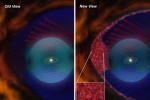Pacific Salmon Have Built-In GPS That Uses A Magnetic Field To Guide Them Home

Chinook salmon living in the Pacific Ocean have a kind of inborn GPS system that directs them home, according to a new study published in Current Biology. The authors of the study argue that we now know why every young hatchery salmon, even with zero prior experience, will rush headlong to the marine feeding grounds frequented by their ancestors. That's because their inbuilt GPS helps them orient according to the Earth's magnetic field in the desired direction.
Like Us on Facebook
"In essence, the fish act as though they have a map based on the magnetic field," Nathan Putman of Oregon State University said in a press release. Salmon can change their swimming direction to go back, if they experience a magnetic field north or south of their typical ocean ranges, according to Putman.
In an earlier study on migrating sea turtles, Putman and colleagues demonstrated the role magnetic field plays in enabling the reptiles to figure out both their north-south and east-west positions. Earlier, the experts didn't have a precise idea of the role magnetic fields played in guiding the animals in the east-west direction. Putman's research at the time helped settle the issue. In addition, yet another study by Putman and his team provided the evidence of a magnetic sense of direction in the sockeye salmon.
The present work explains the remarkable sense of direction in some animals like salmon and turtles depends not just on a single feature of magnetic field but on a combination of magnetic intensity and inclination angle. Salmon can direct themselves in the right direction by sensing the subtle differences in both characteristics. Moreover, these navigational skills are instinctual rather than learned.
"Our findings are certainly suggestive that before the fish even hit the ocean, they have information about how they should orient to reach, or remain in, favorable locations," Putman said.
However, scientists do not yet know whether the fish utilize the same mechanism to travel back or stay wherever they are within a range, according to Putman. Nevertheless, this work clearly shows that salmon are incredibly sensitive to magnetic fields, "The changes we made in our experiments were not even strong enough to deflect a compass needle," Putman said. The paper argues that humans potentially expose fish to much harsher fields that overwhelm their inherent ability at a given location to perceive Earth's magnetic field. The sensitivity of the salmon (and other farmed fish) must be factored into while rearing hatchery fish in artificial environments made of iron, concrete, or other materials.
© 2012 iScience Times All rights reserved. Do not reproduce without permission.

25 Year Study Reveals Eco-Farming To Be Economically Feasible And Sustainable

How Methane-Producing Microbes Caused The Largest Mass Extinction The World Has Ever Seen

Terrifying Animatronic Robot Dances To 'Blurred Lines,' Causes Nightmares [VIDEO]

Scientists Demonstrate Three-Way Quantum Communication: What's Faster Than The Speed Of Light?

Woolly Mammoth DNA To Be Cloned, Then Joined With Elephant DNA To Create New Creature

Oculus Rift Headset Will Take You On A Trip To Space, All From The Comfort Of Your Couch



![How to Turn Your Tap Water Faucet Into a Coffee Spout [VIDEO]](../../../cdn-sub/data/thumb/mainpage/6005-150100-coffee.jpg)

